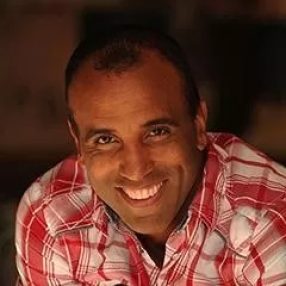
Keenan on Sales Leadership and Coaching
Transcript of podcast interview with Steven Norman and Keenan
Steven: Welcome everybody! Really pleased today to have a very special guest: Keenan. He’s the Founder of A Sales Guy, which is a great sales consulting and recruiting company, he’s got a huge following on LinkedIn, he’s a great keynote speaker, and he was just ranked number seven out of the top 20 sales influencers.
Keenan is also the author of a book I’d recommend to everyone, Not Taught: What It Takes to Be Successful in the 21st Century That Nobody’s Teaching You, he’s a great personality, and he’s got great thoughts on sales and what we should be doing – Keenan, welcome to the show!
Keenan: Thank you, baby – thank you!
Steven: Great to have you here! Let’s get into it: what are some of the major common issues you see in sales teams today?
Keenan: Woo, that’s a broad question! What side of the coin do you want me to take, what I call the participant, the individual practitioner, or do you want me to talk about the leadership side?
Steven: More leadership. When you look at sales structures, sales processes, what people are doing versus what they should be doing, where managers are directing their people, in the right way or the wrong way.
Keenan: Yeah. The biggest challenges I see in sales organisations at the leadership level are number one is poor leadership: horrible, horrible leadership!
No one really paying any attention to who they’re hiring, they’re trying to hire the best person, the best salesperson, they get no leadership training or very little leadership training. Even if they do get leadership training, their leaders, the second line managers don’t actually coach them on leadership, don’t evaluate them on leadership.
It’s the focus on numbers, undying, almost obsessive drive to the numbers, which seems like the right thing to do but is actually undermining the sales coaches! Because they’re not focused on anything else, they’re not focused on things that get them to the numbers: the processes, the methodologies, the individual leadership, the talent identification… Yeah, the leadership and culture is what the biggest problems are.

Steven: Right. So, what should that look like do you think?
Because there’s huge pressures on sales managers, sales leaders, they’re getting hit on the number every day, getting hit on activity every day. How do they manage that better? Or what does good look like around this?
Keenan: Look, we know you’ve got to get the number, but a lot more has to be focused on the how. We’re too focused on the what: I’ve got to get a million – push, push, push, push – and it’s on this how hard are you working, how much drive have you put in, did you make the number? And no-one stops to ask the question how are they doing, how are we going to market?
So as a second line manager and a third line manager, you need to really ask yourself what sales strategies have you put in place? What sales methodologies and processes have you put in place? How are you evaluating your sales team’s effectiveness? And I don’t mean on the number.
If you’re going through your sales team and you’re saying, “This is how I evaluate my sales team: 22% are above quota, 60% are at quota, and 18% is below quota and get rid of the 18%,” then you’re a clown, you’re a clown, because you’re missing the point! Why are those 22% above quota? What are they doing. What are the 60% doing? What methodologies am I driving through the organisation? What behaviours do I expect, what tools am I providing to the team, what processes do I employ to help drive them in the right direction? Where am I providing the support? It’s all of that stuff that they need to be focused on!

Steven: Yeah, too much focus on what versus how. I’d like to get into some of the hows in a minute and get some of your tips on those. You also mentioned coaching the sales managers and sales leaders, coaching the next level guys.
Tell me a bit more about that, what’s happening and not happening there?
Keenan: It’s interesting you ask that question: I literally, literally just sent out our survey to our sponsors to evaluate before it gets published, and in this survey we surveyed one thousand salespeople and sales leaders around coaching, and what we’ve found is that people who are coached I think are 32% more likely to exceed quota than those who aren’t.
Steven: Yeah. It’s not surprising, but it’s great to hear it comes out on the data.
Keenan: Yeah. Another fascinating thing we’ve found is that roughly 84% of all sales managers, that’s first line and second line and beyond, say they coach their salespeople, but only 42% of salespeople say they’re coached – massive disconnect, huge! We asked over a thousand salespeople and sales managers, we went deep and we went big on this!
So what this says is that sales organisations don’t have coaching cultures, they don’t know how to coach, coaches fake their coaching and think they’re getting involved when they’re not. Another statistic that came up is we asked them how frequently they coach, and one of the answers was every day, once a week, once every two weeks, once a month and over a month. That almost completely flipped: salespeople say that they don’t get coached that often every day, but they get coached a little more weekly and then even a little more bi-weekly and a bunch monthly and then not too much after that. But sales managers say they coach every day! So it’s like the lowest number of salespeople every day, sales coaches every day, and then they say they don’t coach that much monthly, but salespeople say pretty much all they get is coached monthly. Massive disconnects in how they’re coaching and how the coaching is perceived.
Steven: What do you think good coaching looks like? Should sales managers be coaching every day or every week, one-on-one, group? What do you think works well?
Keenan: I think if you have a chance to coach every day, you should, but I don’t think you should build the cadence for that. We actually have a proprietary coaching here at A Sales Guy that talks about building a coaching cadence. So what you need to do is you first need to identify what behaviours you want to coach, and we believe there’s two types of behaviours you coach. You coach the selling behaviours and selling skills, so you want to coach on the skills themselves, like cold calling, writing messages, engaging with people, discovery – tactical selling skills. Then you want to coach what we call the personal development or career development stuff: their ability to communicate and engage with others, leadership, self-awareness, those broader personal skills that allow someone to grow within an organisation, whether it would be sales or whatever, that whole personal development and career development skills, and then you build the cadence for that.
We recommend a weekly cadence for the sales skills in the pipeline, like your pipeline meetings and other types of opportunities, you look for weekly or bi-weekly for this coaching of the sales skills, and then we recommend a 6-8-week cadence where you coach them on the personal development and growth skills. Then we recommend a whole approach that’s called observe, describe, prescribe, absorb and apply. So we teach these managers to look for observable moments along the skills that you’re coaching, then you describe what you observed and the impact of that observation, then you prescribe an alternative approach and the impact of that approach, so “If you’re doing this you’ll get this, but if you do this you’ll get that,” then you watch did they absorb what you shared with them, and then you watch them apply, and rinse and repeat – that’s how we do it.

Steven: So you’ve got quite a detailed approach and structure. And I’d agree, I don’t see many organisations having such a serious approach to sales coaching. So I think that’s really valuable, to have a cadence on the skills, a cadence on the personal development, and then a structure on how you do that – that must be really powerful. Tell me more about the how? What are some of the hows that sales leaders should be looking at and working with their teams on, rather than a what?
Keenan: When you say the hows, take a look at the skills that are required for the job. One of the biggest mistakes sales organisations make and people make is they assume that all sales skills are created equal and they go across every position. Well, that’s not true. If I’m an inbound SDR, the selling skills that make me good at my job are going to be very different than the selling skills of the outside, outbound account executive.
So the first thing I tell people is take a look at the role and ask yourself what skills are required to be successful in that role, write them down, define what good looks like, and then coach on those and then look for observable moments in those. For instance, if it’s an outbound SDR, one of the things I might want to talk about is their email creation, and unless marketing is doing it for them, they have to write their own emails. How are they writing their emails? How is the offer, what’s the ask, how intriguing is it, what is the response rate? It could be also how is their research, I look for observable moments around their research. How are they finding the people they call? How are they determining what the message is? Why do they think that was a good target? I want to look at that and say, “Hey, this was good. I saw how you did this, I saw the impact. I also saw you do this, and this impact wasn’t what you were looking for. Let me prescribe this instead, I think you’ll get this outcome.” That’s how you do it!
Steven: Absolutely, absolutely…
We leave the interview there for now, to hear the full 30+minute discussion
Listen to the complete Podcast with Keenan Here.
There is definitely a lot of value in there. Please share the knowledge or leave me your comments.



